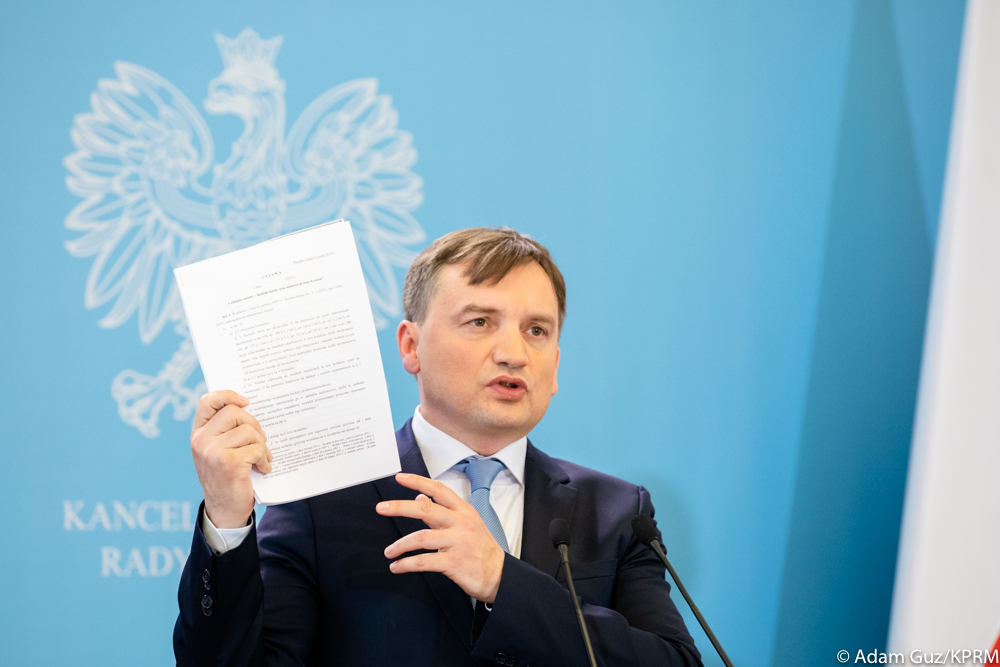Poland’s justice minister, Zbigniew Ziobro, is seeking to take Germany to the Court of Justice of the European Union (CJEU) for its “politicisation of the judiciary”.
The move represents a counter-attack after Poland has itself been repeatedly accused of politicising its judiciary by the European Commission, which has launched a number of cases against the country at the CJEU.
The Polish government, however, argues that the judicial mechanisms it has introduced are similar to those present in western countries. It accuses Brussels of employing double standards as part of a “colonial” attitude towards eastern member states. Such claims have been rejected by many legal scholars.
To w Niemczech w procesie nominacji sędziów do odpowiednika SN decydującą rolę mają politycy. Skieruję do Rady Ministrów wniosek o rozważenie podjęcia procedury prawnej pozwania Niemiec przed TSUE za naruszenie traktatów UE przez upolitycznienie sądownictwa.
— Zbigniew Ziobro | SP (@ZiobroPL) October 18, 2021
“It is in Germany that politicians have a decisive role in the process of nominating judges to the equivalent of the Supreme Court,” said Ziobro today.
He therefore announced that he was issuing a request to the Polish government to “start legal action to sue Germany before the CJEU for violating the EU treaties by politicising the judiciary”.
Ziobro is the leader of United Poland (Solidarna Polska), the most eurosceptic member of Poland’s national-conservative ruling coalition. He has often taken a harder line against the EU than his colleagues in government. Earlier this year, Ziobro accused Brussels of engaging in a “hybrid war” against Poland.
“The rule of law is a pillar on which the European Union is founded,” said Ziobro in his remarks today, quoted by Wirtualna Polska. “However, for all this to work, we need equality of all states in terms of the rule of law.”
He noted that “fingers have been pointed at Poland for some time” over its “supposedly political appointment of judges”. He admitted that the government has “introduced the principle of referring to the will of the parliament as one of the elements when appointing judges”, but argued that “safeguards” are in place.
By contrast, the appointment of judges in Germany “is purely political”, he argued. “Politicians de facto decide who will be a judge of the Supreme Court.”
The justice ministry wants the CJEU to issue “an interim measure suspending the provisions on judicial appointments in Germany pending a [final] ruling”, said deputy minister Sebastian Kaleta, speaking alongside Ziobro.
Patryk Wachowiec, a legal analyst at the Civil Development Forum (FOR) think tank, responded to the news by saying that “there is no comparison between the German procedures for appointing judges and the Polish doormat” created by the government to appoint them in Poland.
That latter body, the National Council of the Judiciary (KRS), was in 2019 found by Poland’s own Supreme Court to “not [be] an impartial and independent body” after reforms by the government that gave politicians control over appointing most of its members.
Wachowiec also noted the irony that last year Ziobro proposed to the European Commission that, as a way of resolving their rule-of-law dispute, Poland could introduce a system for appointing judges modelled on the German one. Yet now Ziobro is arguing that such a system violates EU law.
After claiming that they were being treated unfairly by Brussels, the Polish and Hungarian governments last year announced that they would jointly create an institute to assess the rule of law in EU member states. No such body has since been created.
Main image credit: Adam Guz/KPRM (under public domain)

Daniel Tilles is editor-in-chief of Notes from Poland. He has written on Polish affairs for a wide range of publications, including Foreign Policy, POLITICO Europe, EUobserver and Dziennik Gazeta Prawna.




















